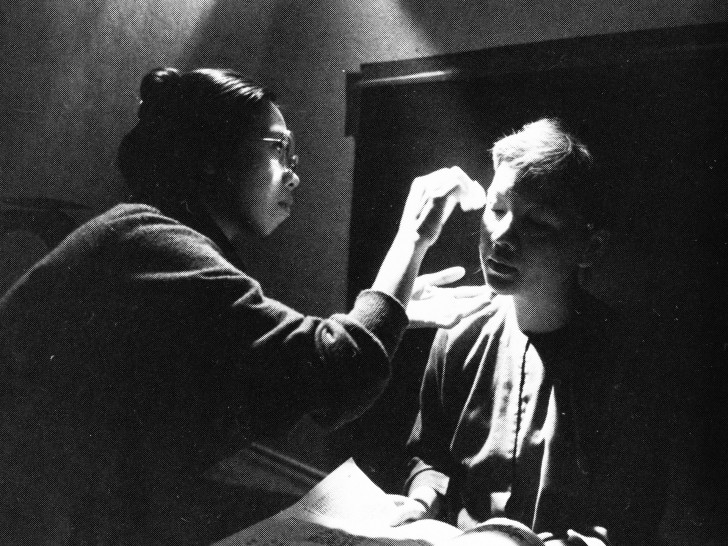Back to Asian Americans on Celluloid Timeline
Surname Viet Given Name Nam (1989)
Director: Trinh T. Minh-ha
Producer: Jean-Paul Bourdier
Length: 108 minutes
View the film on:

Synopsis
Surname Viet Given Name Nam tells the story of Vietnamese women, exploring themes of culture and women’s resistance. Trinh T Minh-ha’s documentary explores the role of Vietnamese women in society, commenting on the traditions and expectations they adhere to. Memory- and story-telling through intimately constructed interviews layered with other various snippets of speakers, classrooms, and water make for a film that recalls not only the lives of Vietnamese women past but also present.
Significance
Trinh T. Minh-ha utilizes interviews conducted by Mai Thu Van some years previously, taking the words of Vietnamese women from the 1970s and reinterpreting them through Vietnamese American women from the late 1980s. Mai Thu Van originally conducted these interviews in Vietnamese for her own film, Vietnam: un peuple, des voix, which were translated to English for Surname Viet Given Name Nam. Trinh T Minh-ha utilizes traditional song, percussion, photography, and displayed quotes along with the reappropriation of Mai Thu Van’s material. Over the course of the film, the apparent interviews become more obviously costumed and staged.Trinh T. Minh-ha can even be heard asking her actresses why they agreed to be a part of the film. In a way, the characters are “going off-script,” making the audience aware of the constructed aspects of documentary-style films. Surname Viet Given Name Nam received heavy criticism for the way its obviously fabricated elements create a disconnect in the audience’s sense of authenticity about the interview. While many filmmakers aim to mask these constructed elements, Trinh T. Minh-ha attempts to unmask these attempts in her film making. This kind of unmasking speaks to the power of fiction and its truth-telling ability.
The filmmaker: Trinh T. Minh-ha (b. 1952)
Born in Hanoi, Vietnam, Trinh T. Minh-ha migrated to the US to study music composition, ethnomusicology, and French literature at the age of seventeen in 1970. She went on to conduct research in Senegal where she produced her first two films, Reassemblage (1982) and Naked Spaces: Living is Round (1985). Since then, she has produced numerous feminist works of literature and even multimedia installments. and She is best recognized for her independent films and as a post-colonial theorist. Trinh T. Minh-ha has been the recipient of prestigious awards including the 2012 Lifetime Achievement Award from the Women’s Caucus for Art. She is currently a professor of Gender and Women’s Studies and Film at the University of California, Berkeley.
Back to Asian Americans on Celluloid Timeline
Further reading and listening
Academic Books and Chapters:
- Katherine Graki. (1989). “True Lies: Staging the Ethnographic Interview in Trinh T. Minh-ha’s Surname Viet, Given Name Nam.” Pacific Coast Philology, vol. 38, pp. 48-63. (review of Surname Viet, Given Name Nam and its lasting impacts in film)
- Sumiko Higashi. (1990). “Review [Untitled].” The American Historical Review, vol. 95 (4), pp. 1124-1126. (review of Surname Viet, Given Name Nam)
- Trinh T. Minh-ha. (1990). “Documentary Is/Not a Name.” October, vol. 52, pp. 76-98. (further writings by Trinh about the genre of documentary and ethnographic film)
Interviews:
- Interview conducted by Video Data Bank: Trinh T. Minh-ha: An Interview (focuses on her early films including Surname Viet, Given Name Nam as well as the “politics of the interview.” Available on Kanopy, most public libraries offer free subscriptions to Kanopy via your library card number.)
- Interview conducted at the San Francisco International Film Festival at BAMPFA: Trinh T. Minh-ha: SFFILM Persistence of Vision Award + WHAT ABOUT CHINA? (on the occasion of receiving the SFFILM Persistence of Vision Award, featuring Trinh in conversation with fellow UC Berkeley professor, Rizvana Bradley)
